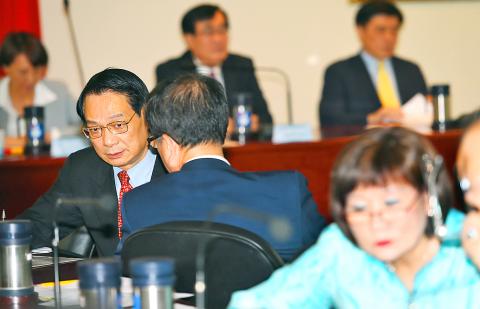Chinese Nationalist Party (KMT) Chairman Eric Chu (朱立倫) yesterday rejected the idea that the party ignore its primary system and draft a candidate to run in next year’s presidential election, party spokesperson Lin Yi-hua (林奕華) said.
KMT Legislator Lu Hsueh-chang (呂學樟) and other KMT Central Standing Committee members suggested during yesterday’s weekly meeting that the party rely solely on polls to decide whom to nominate for the January election.
Lu suggested that Chu, Legislative Speaker Wang Jin-pyng (王金平), Vice President Wu Den-yih (吳敦義) and Deputy Legislative Speaker Hung Hsiu-chu (洪秀柱) be listed as possible candidates and that the party’s ticket be based on who places first and second in the polls.

Photo: Chang Chia-ming, Taipei Times
The KMT’s primary rules stipulate that the party can only draft a candidate when the hopefuls who have met the signature collection threshold fail to be backed by more than 30 percent of respondents in a poll comparing them with the Democratic Progressive Party’s (DPP) presidential nominee, held as the second stage of the primary process.
Hung was one of only two party members who registered for the presidential primary.
However, she was the only one whose valid signature collection met the required threshold.
At present, Hung would be the only KMT member pitted against DPP Chairperson Tsai Ing-wen (蔡英文), her party’s presidential candidate.
Lu said he was worried that such a poll could be rigged by Tsai’s supporters because they would like to see Hung win the KMT nomination.
Another suggestion was made that if such a poll is to be conducted, pan-green camp supporters should be excluded, Lin said.
Lu’s proposal was not accepted by the committee after Chu urged the party to unite behind its primary system and not to take a pre-determined stance, Lin said.
According to a survey by the Chinese-language China Times newspaper, 34 percent of the respondents said they would vote for Hung in January’s election.
Hung said that although she did not think it would be easy to meet the requirement of winning more than 30 percent support in a head-to-head poll against Tsai, the suggestions by the Central Standing Committee members seeking alternative candidates would “spur” her efforts to win support from the public, especially those voters in southern Taiwan.

NATIONAL SECURITY THREAT: An official said that Guan Guan’s comments had gone beyond the threshold of free speech, as she advocated for the destruction of the ROC China-born media influencer Guan Guan’s (關關) residency permit has been revoked for repeatedly posting pro-China content that threatens national security, the National Immigration Agency said yesterday. Guan Guan has said many controversial things in her videos posted to Douyin (抖音), including “the red flag will soon be painted all over Taiwan” and “Taiwan is an inseparable part of China,” while expressing hope for expedited “reunification.” The agency received multiple reports alleging that Guan Guan had advocated for armed reunification last year. After investigating, the agency last month issued a notice requiring her to appear and account for her actions. Guan Guan appeared as required,

Japan and the Philippines yesterday signed a defense pact that would allow the tax-free provision of ammunition, fuel, food and other necessities when their forces stage joint training to boost deterrence against China’s growing aggression in the region and to bolster their preparation for natural disasters. Japan has faced increasing political, trade and security tensions with China, which was angered by Japanese Prime Minister Sanae Takaichi’s remark that a Chinese attack on Taiwan would be a survival-threatening situation for Japan, triggering a military response. Japan and the Philippines have also had separate territorial conflicts with Beijing in the East and South China

A strong cold air mass is expected to arrive tonight, bringing a change in weather and a drop in temperature, the Central Weather Administration (CWA) said. The coldest time would be early on Thursday morning, with temperatures in some areas dipping as low as 8°C, it said. Daytime highs yesterday were 22°C to 24°C in northern and eastern Taiwan, and about 25°C to 28°C in the central and southern regions, it said. However, nighttime lows would dip to about 15°C to 16°C in central and northern Taiwan as well as the northeast, and 17°C to 19°C elsewhere, it said. Tropical Storm Nokaen, currently

PAPERS, PLEASE: The gang exploited the high value of the passports, selling them at inflated prices to Chinese buyers, who would treat them as ‘invisibility cloaks’ The Yilan District Court has handed four members of a syndicate prison terms ranging from one year and two months to two years and two months for their involvement in a scheme to purchase Taiwanese passports and resell them abroad at a massive markup. A Chinese human smuggling syndicate purchased Taiwanese passports through local criminal networks, exploiting the passports’ visa-free travel privileges to turn a profit of more than 20 times the original price, the court said. Such criminal organizations enable people to impersonate Taiwanese when entering and exiting Taiwan and other countries, undermining social order and the credibility of the nation’s